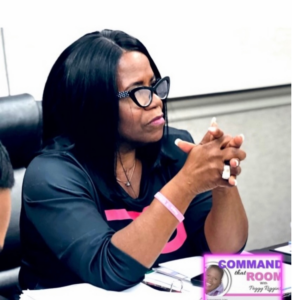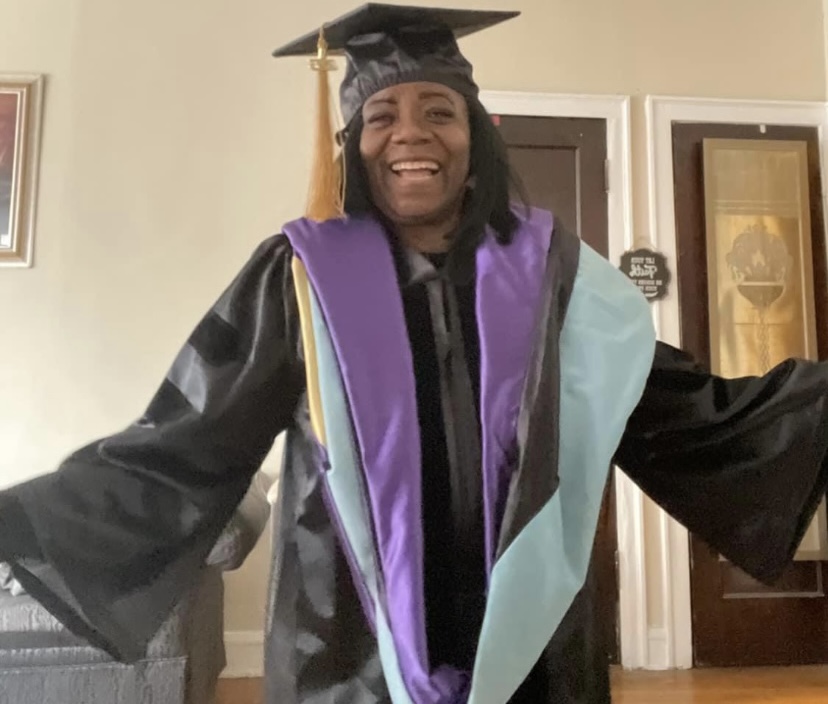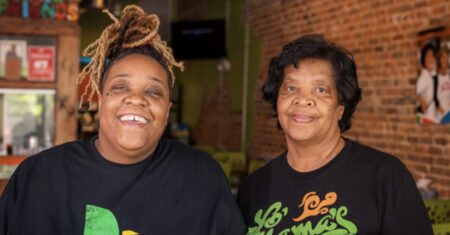Photo caption: Peggy Riggins
Peggy Riggins is on a mission to get African Americans to drink more water, embrace natural medicines and end their reliance on pharmaceuticals. The former corporate pharmacist believes a key to ending generations of healthcare disparities lies in significant shifts in lifestyle changes including food and beverage consumption.
On July 29th at 10 a.m. Riggins will host a “water party” in the Englewood neighborhood at Zion Temple Church, 7010 S. Union. The event will feature workshops and special guests from local health care organizations working on improving community health outcomes. She said in addition to speakers, guests will be treated to a variety of products designed to encourage hydration.
“I started a women’s pharmacist organization for women in pharmacy and I set out to speak all over the country,” Riggins explained to the Crusader. “That was my goal–to share the good news of getting health and heal in God’s way. And that it was not so much in the medication. I felt it was for us to just make ourselves our first priority. And let God’s pharmacy be the grocery store.
“We’re going to have a party we’re gonna have all kinds of water,” she said. “We’re gonna have a bar not with Patron or Jack Daniels. We’re gonna have coconut water, alkaline water, mango, watermelon, water, smoothies, fruit infused water. And we’re gonna talk about the benefits of water.”
Riggins grew up in the working-class community in the 1970s, the daughter of a mother who worked for the city, and a father who worked for years at International Harvester. Instilled with a sense of pride and love for education, she went to a neighborhood public school, graduated from Lindblom High School and started college at Western Illinois University.
Riggins said that it was while studying at Western that she took a summer internship at a West Side pharmacy owned and operated by Dr. Richard Crumble. K Town Drugs at Madison and Kilborn provided a hub of support for customers and residents with limited access to healthcare professionals. She said the store was more than just ‘dispensing pills’ it was central to overall wellness.
“Dr. Crumble was well-known and well-loved and was a pillar in the community,” Riggins said. “He was seen as a vital part of a person’s care team and he treated everyone like a family member. I realized that oftentimes, the neighborhood pharmacist is the first healthcare professional a person might have contact with outside of a clinical setting. I learned the value of communicating with people and serving as a resource.”
Independent, small Black-owned pharmacies were prevalent before corporate retail giants such as Walgreens, Wal-Mart, Rite-Aid and CVS saturated urban communities in the $1.4 trillion industry. Early 20th-century African American pharmacists gained education and training at segregated pharmacy schools and or historically Black medical colleges and universities, such as Meharry Pharmaceutical College in Nashville.
According to historian John E. Clark, graduates of the “schools were perceived as inferior and indifferent by other pharmacists,” he wrote in “Early Education of African American Pharmacists 1870-1975. “They were also not trusted and were thought to be incompetent.”
Dr. James T. Wormley is cited as the nation’s first Black pharmacist, having graduated from Howard University with a concentration in pharmacy in 1870. The occupation opened up at the turn of Reconstruction when the federal government pledged to provide newly emancipated people with education, housing, employment and health care.
Many newly freed people, having served all of their lives in bondage, were in dire need of medical services, including pain relief and other remedies to ease physical trauma caused by brutal chattel slavery. Because medical professionals willing to work with Blacks were insufficient, the need for Black doctors, nurses, and other medical professionals to slow the health care crisis.
Historians also provide evidence that today’s healthcare crisis, often cited as generational, has its roots in slavery and the mishandling of freed people after the Civil War. “The Freedman’s Bureau Act signed into law on March 3, 1865, was the federal government’s first attempt to provide a group of citizens with health care.
“Medical services provided were temporary and very insufficient to meet demand,” Clark said. “By 1910, it was estimated that 9.8 million African Americans were in need of health care. It has been suggested that the health disparities seen today are the result of the healthcare crisis created at the end of the Civil War and the impact of the closing of the African American medical schools.”
Mostly prevalent in the “Black Belt” or southern and rural communities where more than 50 percent of the formerly enslaved continued to live, the nation’s health care crisis among Blacks blossomed. The dire situation led to the growth of individuals seeking training and eventually certification in various medical fields. Segregation, racism, and other tools of white supremacy kept most qualified Blacks out of white medical and pharmacy schools.
This led to the rise of a number of Black medical schools–most of which were forcibly closed after the Carnegie Foundation recommended 40 percent of medical schools, established between 1868 -1907, for the purpose of serving African American patients, be closed. The closures led to a significant decrease in Black physicians and others working in the fields of medicine and dental health.
Though institutions such as Provident Hospital and Training School, which opened in 1891 and vigorously trained Black nurses and physicians, other institutions faced fiscal crises and other challenges leading to closure or the reduction in medical training programs.
Reportedly, there are seven schools that continue to produce the most African American pharmacists in the U.S., according to Clark. They include Xavier University, Texas Southern University, Florida A&M University, Hampton University, Chicago State University, and the University of Maryland Eastern Shores School of Pharmacy.
Data suggests there are over 313,799 pharmacists currently employed in the United States. 56.8 percent of all pharmacists are women, while 43.2 percent are men. About 63 percent of pharmacists are White followed by Asian (20.9%), Black or African American (7.0%) and Hispanic or Latino (5.6%).
According to the American Association of Colleges of Pharmacy, in hospital settings, the high-cost specialty treatments have pressured pharmacy department budgets. “Supply chain issues and drug shortages have necessitated strategic problem-solving and allocations to maintain critical care functions,” the group said in a 2019 workforce study.
“Pharmacy practice and the profession continue to evolve and respond as both external and internal factors have led to changes in service delivery and work-life. Limited payments for many pharmacy services have influenced pharmacists’ ability to provide them,” the study said.
As for Riggins she was so inspired by her work on the West Side that she transferred to Crumble’s alma mater at St. Louis College of Pharmacy. After graduating in 1985 with honors, she said she continued her mentorship on the West Side before taking a job at Walgreens where she would work for 30 years. Under the guidance of her mentor, she doled out medications and consulted with patients on a myriad of problems, including diabetes, hypertension, and HIV/AIDS.
Riggins worked primarily overnights at Walgreens at 75th and State Street and at 35th Street and King Drive for most of her 30-year career. “I preferred overnights because I was able to consult with more patients and spend more time talking to them about their health care needs,” she said. “I learned that often I was the first health care professional they’d see after being diagnosed.”
She said primarily she found that many of the diseases she dispensed medications for could be treated or even cured with basic lifestyle changes. “Sixty percent of my patients were from underserved communities and uninsured,” Riggins said. “I noticed patterns in the ailments they suffered from and understood the toll these diseases took on the human body.”
The most common problems included heart and kidney diseases, which Riggins said she believed are triggered by dietary choices among her patients. Similar to a controversial, one-cent, sweetened beverage tax imposed and repealed by Cook County government in 2017, the pharmacist’s campaign to educate people on reducing soda intake has been a challenge.
However, research also indicates that environmental and social factors beyond people’s control, including structural racism and poverty, which induces stress and mental disorders and can also limit healthier options contribute to poor health among Blacks and others subjected to systemic oppression. In addition, some individuals are genetically predisposed to certain diseases and may exhibit them despite their efforts to choose healthy lifestyles.
Further, the pharmaceutical industry has been criticized for targeting both the healthy and unwell with daily doses of medicines, narcotics and drugs. Americans live under the constant threat of disease and death. The recent global pandemic only exacerbated the problem.
Prescriptions for heart medications and antidepressants have soared astronomically in the wake of the coronavirus, according to the National Institute of Health.
“Before COVID, my people were sick. After COVID my people are dying. And it’s something called post-COVID,” Riggins added. “I say all that to say I’m a voice for the voiceless. I go around sharing knowledge, expertise, and now a personal experience that the body can heal itself. But we just have to get back to nature and start making ourselves a priority.”
Perhaps it was Riggins, a mother of an adult son, own health scare that gave her the most energy to galvanize people toward lifestyle changes. She says she spent 26 days in a coma, before miraculously recovering with a new perspective on life. The challenge led her to begin speaking to friends, colleagues, and eventually larger audiences, extolling the benefits of holistic healing and self-care.
“I woke up from the coma, and I got right back to work, of building healthier communities,” Riggins said. “After founding my organization and getting to work, I began to share the Word and figured out that when my sisters and my brothers picked up the mic. That’s when the real healing starts.”
The renewed focus led Riggins to embrace her inner entrepreneur and she began selling wellness products and encouraging water consumption as an alternative to sodas, alcohol, and other beverages. In August, she will be a featured speaker at the Black Women’s Expo where she will spearhead a panel, “Command the Room,” as a challenge for women to embrace healthy lifestyles.
“That was my goal, to share the good news of getting health and heal in God’s way,” she added. “And that it was not so much in the medication. I felt it was for us to just make ourselves our first priority. And let God’s pharmacy be the grocery store.”








